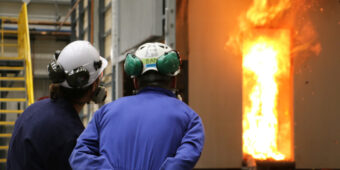Stay safe around power tools
25 Jan 2024, Prove Your Know How, Site Safe

Power tools are essential items on construction sites. They offer enhanced speed, strength, and efficiency compared to hand tools but, when not used properly, they can cause more harm than good
Accidents with power tools can be caused by people not reading or following manufacturers’ instructions, not putting their training into practice, using faulty equipment, or using tools and accessories incorrectly.
It’s too late to plan for safety after an accident has happened, so understanding risks and how to minimise them is crucial to keep everyone safe onsite.
Common power tools include saws, grinders, sanders, drills, drivers, nail guns, planers, fastening tools, and breakers. They can be electric-powered (mains or battery), pneumatic-powered (gas or air) or powder-actuated.
Here are some tips to ensure everyone’s safety onsite when power tools are involved.
Use the right tool for the job!
It’s important to always use the correct tool and accessories for the job you’re doing.
Using the wrong tool or accessory (bit, disk, blade, etc) can lead to the operator taking unnecessary risks that compromise their safety, the safety of others, the quality of the work being done, and the tool itself.
For example, you should always use the appropriate type of saw for the material being cut and the type of cut required, and the right grinding disk for the material being ground.
Power tools should be heavy duty and designated for commercial/professional use. Home handyman versions are not appropriate for daily use on construction sites.
Maintaining and servicing your tools
Any tools you use need to be in good, serviceable condition.
Serviceable condition means getting tools serviced regularly to make sure they are working as they should be. If they’re not, stop using them until they’ve been properly repaired or replaced with a new tool. Persisting in using tools that are not working properly can lead to accidents.
Keeping your power tools well maintained and clean is a great way to prolong their life.
Resist the urge to make ‘homemade’ repairs, which may compromise the condition and reliability of your tools.
Suitable training
People need to be trained in the correct use and operation of specific power tools.
It’s an employer’s responsibility to ensure workers are properly trained for the tools they’re using and the job they’re doing. Don’t assume that if someone works in the construction industry, they know how to use power tools.
Some tools require more training than others. It’s always a good idea to regularly refresh your knowledge, check competence in use, and record formal training in the training and qualification register.
Powder-actuated tools (PATs) require operators to hold a Certificate of Competency for the type and model of tool being used. They should only ever be operated by properly trained and certified persons.
Keep the site safe and tidy
A tidy site is a safe site.
Always ensure power tools are appropriately stored when not in use. Never leave them unattended or unsecured.
PATs and charges must be stored in a lockable, rigid container, which is generally approved and supplied by the manufacturer. Ensure the tool is cleaned and not loaded when it is put away.
Dispose of used accessories in an appropriate manner to avoid others inadvertently getting cuts/punctures.
Always check for hidden services, such as power, water, gas, and telecommunication cabling, before undertaking power tool operations.
Consider using barriers or exclusion zones to protect others from the risks associated with power tool use.
When powder-actuated tools are being used, warning signs and verbal warnings for shots being fired are required.
When using power tools relying on electric cables, always check for visual damage to cables, keep leads off the floor wherever possible, and make sure both the tool and any extension leads are tested and tagged every three months. Cables should be plugged into an appropriate residual current device (RCD) suitable for commercial operation. Never ’piggyback’ plugs or use double adaptors.
If any electrical equipment is found to be faulty, it must be immediately placed out of action until it can be either repaired by a registered electrical worker or replaced.
Protect yourself
Stay on top of your game while at work to protect yourself and the people around you from harm.
Keep well hydrated and make sure you are taking regular rest and meal breaks.
Power tools should not be operated under the influence of alcohol or drugs, including prescription drugs that cause drowsiness.
Ensure you’re wearing the appropriate personal protective equipment (PPE) for the job you’re doing. Common forms of PPE include hi-vis clothing, hard hats, eye protection, gloves, hearing protection, masks, respirators, and appropriate footwear.
Keep body parts, loose hair, and clothing away from the moving parts of power tools.
Don’t muck around onsite – practical jokes can backfire badly and cause serious injury.
Site Safe is a not-for-profit, membership-based organisation that supports a culture of health and safety in New Zealand construction. For more information go to: www.sitesafe.org.nz
Register to earn LBP Points Sign in
3 Comments
Leave a Reply
You must be logged in to post a comment.




good
tool up
Get Insurance for you tools